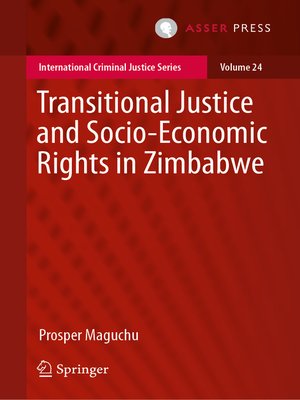Transitional Justice and Socio-Economic Rights in Zimbabwe
ebook ∣ International Criminal Justice Series
By Prosper Maguchu

Sign up to save your library
With an OverDrive account, you can save your favorite libraries for at-a-glance information about availability. Find out more about OverDrive accounts.
Find this title in Libby, the library reading app by OverDrive.



Search for a digital library with this title
Title found at these libraries:
| Library Name | Distance |
|---|---|
| Loading... |
This book addresses the issue of corruption as a socio-economic rights concern at a national level. Zimbabwe's widespread corruption inhibited its development in all aspects. It weakened institutions, especially those called upon to arbitrate political and economic contests, leading to potential human rights violations.
However, Zimbabwe saw a change of government in November 2017. Due to this, there seemed to be an opening to work towards reform in relation to the anti-corruption architecture. Specifically, the new era provides an opportunity to review how accountability mechanisms (including but not limited to amnesties, truth commissions, institutional reforms and prosecutions) can address corruption as a socio-economic rights violation.
As the new government still tries to address competing priorities, many moving parts and various matrixes, this volume in the International Criminal Justice Series provides a timely frame for revisiting the debate and developing the strategic thinking regarding transitional justice options in Zimbabwe.
It will be of great interest to practitioners, policy makers, scholars and students in the fields of anti-corruption, socio-economic and human rights, and transitional justice.
Prosper Maguchu is Visiting Assistant Professor at the Centre for the Politics of Transnational Law of the Vrije Universiteit Amsterdam, The Netherlands.
However, Zimbabwe saw a change of government in November 2017. Due to this, there seemed to be an opening to work towards reform in relation to the anti-corruption architecture. Specifically, the new era provides an opportunity to review how accountability mechanisms (including but not limited to amnesties, truth commissions, institutional reforms and prosecutions) can address corruption as a socio-economic rights violation.
As the new government still tries to address competing priorities, many moving parts and various matrixes, this volume in the International Criminal Justice Series provides a timely frame for revisiting the debate and developing the strategic thinking regarding transitional justice options in Zimbabwe.
It will be of great interest to practitioners, policy makers, scholars and students in the fields of anti-corruption, socio-economic and human rights, and transitional justice.
Prosper Maguchu is Visiting Assistant Professor at the Centre for the Politics of Transnational Law of the Vrije Universiteit Amsterdam, The Netherlands.







